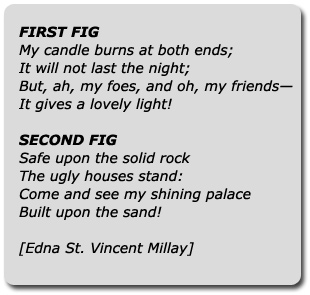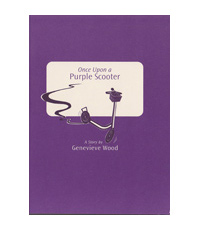

|
|
Works of Genevieve Wood
|
|
||||||||||
About Genevieve E. Wood Genevieve Ella Wood was born April 10, 1918 in Utica, New York. For the next 92 years (almost!), until February 5, 2010 in NYC, she climbed trees, scaled and flipped baseball cards with the boys, discovered the music in poetry, romanced, went to college (University of Wisconsin, Northwestern), and joined the Navy. She was in the first group of women inducted into the Waves in World War II where she served as Morse Code radio operator. Later, she worked mostly in publishing. Starting in her post-Navy years, in the early 50s, she wrote…and wrote…and wrote. She never seriously sought to have her poetry, plays, novels, and other work published. Most of her work was never seen even by her closest friends and colleagues, although it stands with some of the poets she most admired—Edna St. Vincent Millay, Emily Dickinson, Dorothy Parker, and others. Purple Scooter Poetry is proud to bring her buried treasures to light. Gen Wood was a private person, a soft-spoken, gentle soul who liked her solitude and her evening “spirits.” She had a caustic wit and tongue, loved love and was intrigued by the nature of it. She couldn’t abide pretension, hypocrisy, euphemisms, or shrillness. She seldom showed emotion openly—her emotional life was in her writing. She was passionate about words, rhyming, and the sound of words. She speaks about love and death and life with direct unique language and imagery that is often breathtaking. Her laugh-out loud humor, playfulness, and double meaning are delightful. She loved the ocean, and much of her writing reflects that. Her work shows an acerbic wit and wry humor, a powerful sense of the absurd, and is always honest, sensitive, and intelligent. She prided herself on telling it “like it is,”—and sets a high standard for simple, lyrical language.
|
This volume of poetry introduces Genevieve Wood, whose work spanning nearly 60 years was unpublished during her lifetime. Part I, called Growing Up and Growing Down, contains 45 poems from a few lines to a few pages in length. The selections range from somber and sad, to delicate and sweet, to profound and funny. ORDER NOW >
|
Life and Death in Thirty Syllables An infant cries at a funeral An old man dies at a christening
Nouveau Riche The wealth I count The charms I love The Midas Touch
Editor Weds Editor When first these literati met
Second Thought I shall not send thy valentine
Squib and Variations Mullins and Blaise, delinquent friends, Unearthing an antique Roman candle, Lit it…waited…scoffed, “Some dud—“ Hot Mullins for injuries inflicted, Which solves the enigma, I don’t suppose, La, Ann, what a conviction. [Ed. note: A squib is a tiny piece of dynamite. This poem is inspired by a case in English law.] |
|
Case Of Novel Impression Pedestrian the circumstances. Plaintiff’s counsel, well-rehearsed,
Defendant’s counsel, less well-versed,
Emotional, deceased’s appeal. Judge Featherstone instructed them: |
| Lines On A School Teacher’s Shako A black These bees Sir Keats These please, Lee’s Bees.
|
Who? Him? Herman? Hmm... But listen…Herman’s voice is in his hammer…
Hit or miss, the breezes bring
(click here for a reading by actress Patricia Conolly of the entire work) |
|
| Hobeau The kind of guy…if you gave him thirty-six sticks of licorice in a “Jesus H. Christ, Cigarette,” he growled to his scheming, The kind of guy…if you jumped off a roof and sprained your Less said about the trip back west, the better. Three days, two But, what remains to be remembered of my father, after thirty- A brownish snapshot of him, undated, astride a
|
Imagine a time when there was no x-box, no play station, no cell phone, not even a TV! What would a bright, independent 10-year-old girl do? That time is 1927 and the girl is Theodora Zane. Theo is a tomboy with bright red hair. She hates to dress up and thinks her brother is a sissy. She adores her dad and ignores her mom’s sensible suggestions. She has a crush on her best friend, 16-year-old Samantha. And she manages to get into trouble most of the time. Spend one day with Theo as she travels around town on her beloved purple scooter—shooting marbles, trading baseball cards, brawling with a boy twice her size, visiting the airport to see Lucky Lindy, discovering secrets behind closed doors, and having her first brush with tragedy. ORDER NOW > Once Upon a Purple Scooter, written in the 1970s, evokes a special time in American history, when the world was completely different. But the experience of growing up—the yearnings, the thrills, the loneliness, and the intrusion of harsh reality into everyday life—has not changed.
|
Excerpts from Once Upon A Purple Scooter “Today, sitting astride the peak of the roof, turning her face to the sun, closing her eyes, Theo was at peace. The shingles were warm against her legs. And it was Friday—which meant that tomorrow was movie day, the best day of the week. “The next best thing to movies was the penny candy that went with them. Ten cents’ worth of candy never lasted through the whole show, but you had it during the first part, when not much happened. By the end, you were too excited to eat anyway.”
“Her foot slipped, and she had to use both hands to steady herself. So Willie used both hands to tighten his hold on her neck, shaking her head back and forth, slow, then fast….It hurt now—it really hurt! She felt her face getting hot, and it was hard to breathe. As she raised one arm to try to hit the face above her, both of her feet slipped from the branch. She sat down on it hard, dropping straight to the ground… The first thing Theo saw as the blur went away was the bag of marbles at the foot of the tree. The first thing she heard when the ringing in her ears stopped was Willie’s crazy laugh….”You dirty sonovabitch!” yelled Theo. Willie only laughed louder and swung his legs faster.” “In a flash, Theo grabbed the bag of marbles, wrapped the drawstring around her hand, and swung the bag at Willie’s drooling mouth. There were “steelies” in that bag—heavy steel ball bearings used in place of marbles when the grass was tall. The bag caught Willie full on the mouth, and with a howl of pain, he turned and ran—across the dirt yard and up the cement-block steps to his front door, slamming and hooking the screen door behind him.”
“She returned to the steps and opened her precious yellow box to make sure its contents were in perfect order. The edges of the neatly filed cards were white, gray, and almost black. The newest ones were white, the gray ones were her favorites, and the almost-black ones were the gambling cards—the ones she liked least and wouldn’t mind losing—their corners crumpled or missing completely. “The gambling cards were for flipping and scaling. Flipping, Theo explained to her faithful audience, is when you snap one out into the air and it turns over and over until it hits the ground, landing face-up or back-up, heads or tails. Then if you match the other guy’s card, you win his card. Simple. “Scaling is better, she explained further. You take a card between your first two fingers, like this, see, and scale it out into the wind (she demonstrated with an expert snap of her wrist) and whoever scales farthest gets the other guy’s card. Theo won more cards by scaling than by flipping. There wasn’t anything she could do about heads or tails, but scaling required some skill and she could practice getting better and better at it.”
|
This hilarious poetically demanding work sprang from Gen Wood’s imagination after reading a 1952 AP wire clip about a non-military deal between the USSR and GB involving a huge exchange of seafood. An unlikely trio—Winston Churchill and the Duke and Duchess of Windsor—embark in a shaky vessel to save the day. Pray read the tale to see who will prevail. ORDER NOW >
Excerpts from Of Old Sea Dogs and Herringbone Russian fish for British fish |
Weather’s fair. Fishing’s foul. “No herringbone is big enough An idle king was piped aboard |
Weather’s foul. Fishing’s fair. The Duchess paced the slanting deck ~ We laughed in the teeth of a rising gale |
Mirror, mirror, on the sea My crew will swear, and so will I, Sharkskin, oilskin, herringbone tweed,
|
“To port! To port! A periscope! And I myself was full of doubt— The conning opened with a bang! His shrunken body squeezed up through |
I will admit I was surprised “Englishmen!” I shouted back, They understood us not, I think, They pointed straight at our tall fish We rowed half-strength, and as we neared |
As Toby floated out to sea ~ |
| “Full speed ahead!” he bellowed down— The sub set out in chase; We rowed reverse—our only chance To leave that angry place. Inevitably, the sub caught up We swam, and carefully ignored And while the sound of certain death |
THE SEA IS OLD AND DEEP AND WISE |
Kid Hadaway a play written in 1958-60, is an exposé on pretension. Everything is fair game for Wood’s satirical wit—education and its excesses, love, parenthood, friendship, and marriage, birdhouses and bulldozers, precocious kids, the meaning of “home” and “household.” The texture of everyday life is revealed by chance encounters of a zany cast of characters who enter and depart an unusual house warming party literally through a hole in the wall. Robert Frost wrote that “Good fences make good neighbors” but in this case a hole in the wall works even better. The black eye-patch vogue of the 50s is one of Kid Hadaway’s most hilarious, striking images. That and the crisp classy Hathaway shirt worn by discerning men and boys at that time. This highly poetic and literary work is full of rhyme and reason, loaded with musicality, rich with sharp observation and insight, and just plain fun. Its humor comes in many forms, including 14 songs threaded throughout and sung by the characters in solo or duet. ORDER NOW > At one point the Kid sings this about one of the other characters: Sally Ball sat on the wall… And Sally herself laments that: I’m-m-m so-o-o hom-a-ly! People tell me But I’m-m-m so-o-o dumb! I can’t tell a sentence from I flunk! The plot of Kid Hadaway unfolds through a variety of unlikely situations, random interactions, and surprising intrusions of 1950's television commercials--all offered up in high style and inventiveness, on a path of unpredictable twists and turns. Everything is what it seems, and nothing is. Like most plays, this one is written to be spoken, but readers will be rewarded whether they speak it or read it. Even though it was written half a century ago and has not been made public until now, this play has a delightful, engaging quality that resonates in our own time. |
Leave a Comment |
E-Mail List |
Policy |

 On the Crest of a Wave: Selected Poetry of Genevieve Wood
On the Crest of a Wave: Selected Poetry of Genevieve Wood 
 Once Upon A Purple Scooter
Once Upon A Purple Scooter 
 Kid Hadaway
Kid Hadaway